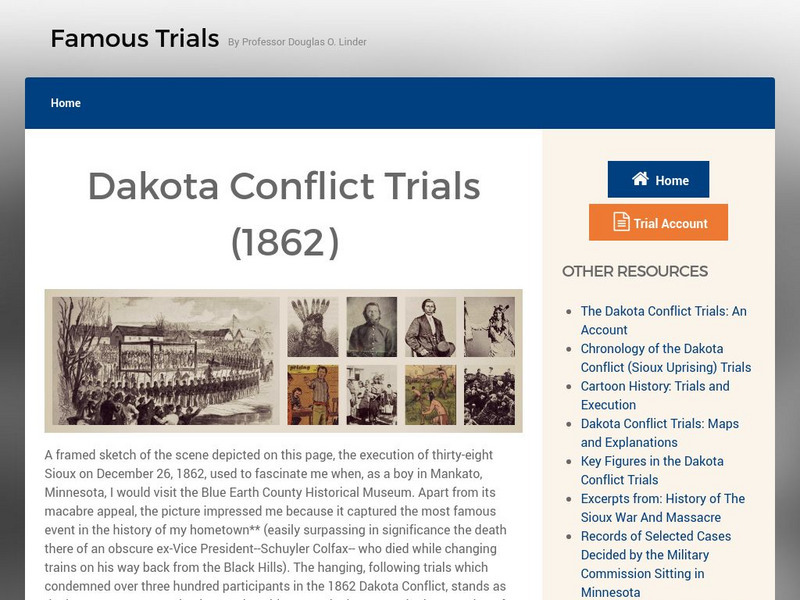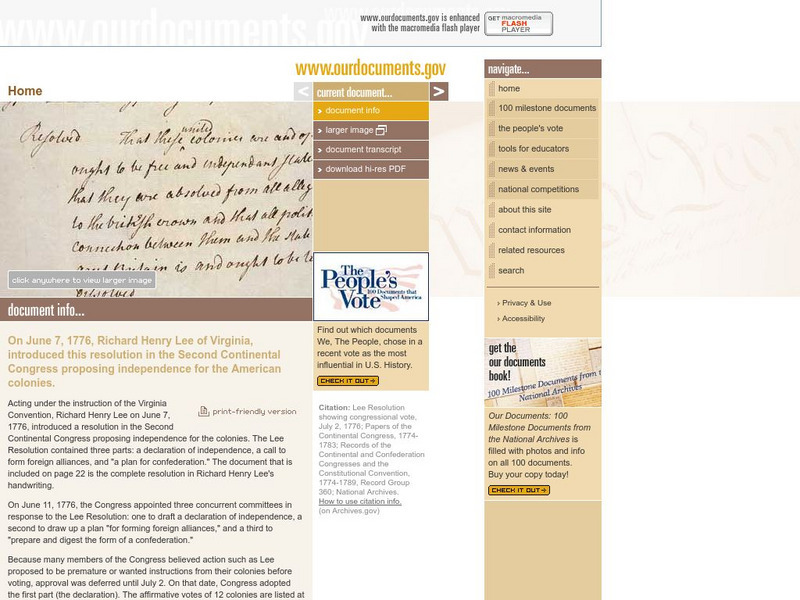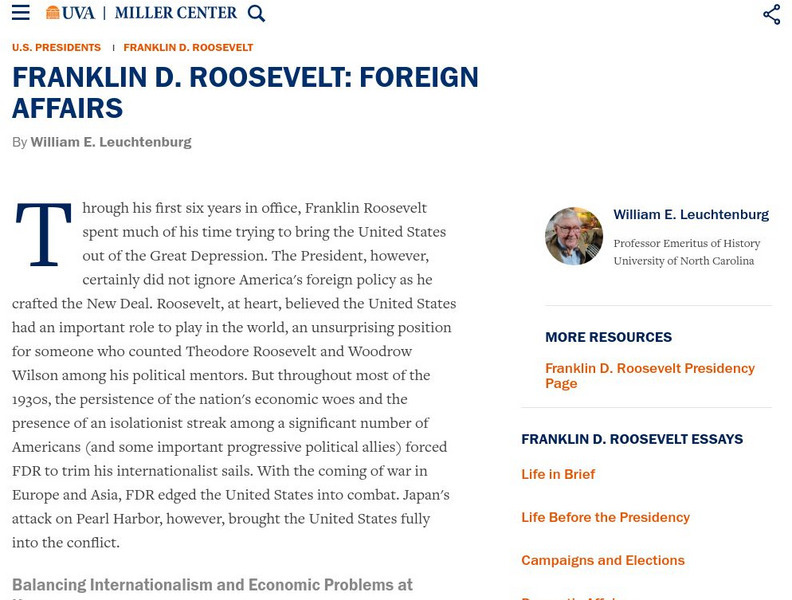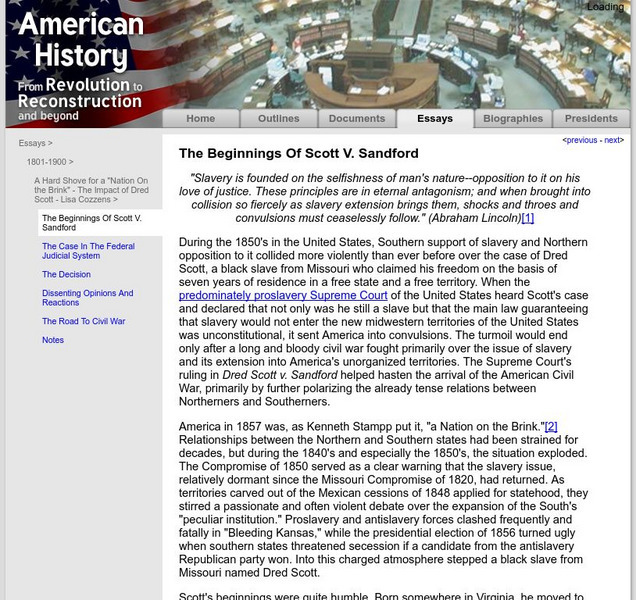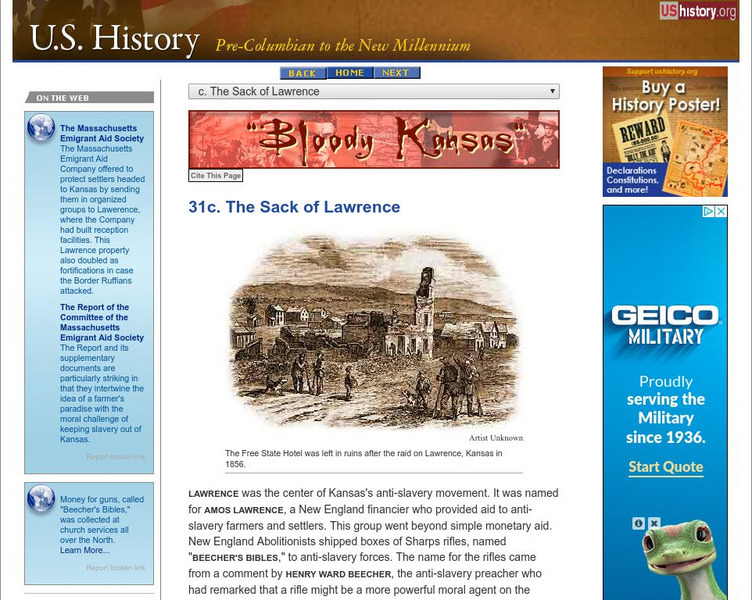Hi, what do you want to do?
Other
American Civil War Homepage: Declaration of Causes of Seceding States
Included is "Declaration of Immediate Causes which Induce and Justify the Secession - from the Federal Union" of each state in the Lower South.
University of Missouri
Famous Trials: The Dakota Conflict Trials of 1862
This site offers an in-depth study of the 1862 Sioux uprising. The framed web pages offer a chronology of the uprising , a cartoon history, pages of maps, biographies of key figures, accounts of the trials and the execution, an...
PBS
Pbs News Hour Extra: 150th Anniversary of the Civil War Fraught With Emotion
Article examines the emotions brought to light due to the 150th anniversary of the American Civil War and the deep cultural divisions that continue across the U.S. to this day. A classroom activity and student worksheet can provide good...
A&E Television
History.com: What Caused the Korean War and Why Did the Us Get Involved?
The Korean War (1950-1953) was the first military action of the Cold War. It was sparked by the June 25, 1950 invasion of South Korea by 75,000 members of the North Korean People's Army. The line they crossed, the 38th parallel, was...
PBS
Wnet: Thirteen: Freedom: History of Us: Fatal Contradiction: Missouri Compromise [Pdf]
A lesson plan from the producers of the 16-episode PBS series "Freedom: A History of US" that examines the goal of the Missouri Compromise. A good lesson plan for comparing and contrasting life in the North and South in the run-up to the...
University of Groningen
American History: Essays: The Black Lost Cause: Examples of Colored Service
African American slaves are known to have fought for the Confederacy during the Civil War, which many people may not realize. Why they would fight on the side of slavery, and the evidence that they did, are discussed in this section of...
Library of Virginia
Death or Liberty: John Brown's Raid
The Library of Virginia details John Brown's Raid on Harper's Ferry as a prelude to the U.S. Civil War. Content also lists various records and resources regarding John Brown's Raid held in the library.
The History Cat
The History Cat: The First Battle of Bull Run
Explains what happened at the initial Battle of Bull Run, the first significant battle of the Civil War. This battle was an eye-opener for both sides, as rifles were now replacing the less accurate muskets, causing more casualties and...
PBS
Pbs Learning Media: Primary Source: Underground Railroad Fugitive Slave Act 1850
This collection uses primary sources to explore the Underground Railroad and the Fugitive Slave Act of 1850.
US National Archives
Our Documents: The Kansas Nebraska Act
An outstanding, interactive copy of the Kansas-Nebraska Act, the legislation that repealed the Missouri Compromise. Historical context included, as well as links to larger images, a typed transcript, and a downloadable PDF file.
PBS
Pbs: Cet: Africans in America: The Raid on Harper's Ferry
PBS' four-part series, "Africans in America," highlights the antislavery movement, including a focus on John Brown's Raid on Harpers Ferry. Content includes a description of the event, as well as the after-effects including the news of...
Civil War Home
Home of the American Civil War: Lee's Letter to Jefferson Davis
Lee communicates the cutoff of supplies and the events which followed it, causing his surrender.
Pennsylvania Historical and Museum Comission
Explore Pa History: Pennsylvania Democrats
A good look at the views of the Democratic Party in Pennsylvania just prior to and during the Civil War. Read about Democratic president from Pennsylvania, James Buchanan, and his views about the importance of slavery in the national...
University of Virginia
Miller Center at Uva: u.s. Presidents: Franklin Delano Roosevelt: Foreign Affairs
Scroll through this discussion of Franklin Roosevelt's attention to foreign policy during his several terms in office to "Confronting Germany and Japan" and "Descent into War." Here you will find out about the United States' position of...
University of Groningen
American History: Essays: Impact of Dred Scott: Beginning Scott v Sandford
Explains the background for the Dred Scott case and its journey through the court system, finally reaching the US Supreme Court.
BBC
Bbc: Colombia's Civil Conflict
This comprehensive profile of Colombia's Civil Conflict examines the conflict's causes, its ramifications on the country, and its implications for Colombia's relationship with the United States. Links to related audio and video are...
US Department of State
U.s. Department of State: Decades of Change: 1960 1980
Summary of the rise of cultural and ethnic pluralism that took place in America between 1960 -1980 causing major social change. Included were such movements as civil rights, women, Latino, Native-American, counterculture,...
Independence Hall Association
U.s. History: The Sack of Lawrence
Read about how the destruction of Lawrence, Kansas, seat of the Free-Soiler government by border ruffians inflamed attitudes in the North toward the actions of the slave-holders.
PBS
Pbs: Africans in America: Slavery and the Origins of the Civil War
An article by Columbia University historian Eric Foner that discusses how long-standing views of the role of slavery in America began to be challenged during the civil rights era of the 1960s by a new generation of historians, whose work...
Forum Romanum
Outlines of Roman History: Reforms of Tiberius and Gaius Gracchus
This chapter in William Morey's 1901 text discusses the land reforms of the Gracchi brothers. Find out how well they worked and the problems they caused.
Cosmo Learning
Cosmo Learning: World Revolutions
Consisting of twenty-six video lectures taught by Professor Thomas O'Brien, this course focuses on the causes and effects of modern revolutions from the English Civil War of the 17th century to the Iranian Revolution at the end of the...
National Endowment for the Humanities
Neh: Edsit Ement: Before Brother Fought Brother
A lesson plan that addresses the "complex series of events" leading to the Civil War. Through this lesson, students will "gain an appreciation of everyday life in the North and South, changes occurring, and some of the major social and...
University of Groningen
American History: Essays: The Black Lost Cause: Elaboration
Explains how the idea of African Americans fighting in large numbers for the Confederate cause is a wrong one that has been propagated by untrained historians who used unreliable sources.
University of Groningen
American History: Essays: The Black Lost Cause:critical Analysis of Examples
Discusses the research by historians to try to determine the extent to which African Americans fought for the Confederate cause. They examined letters, service records, anecdotes, photographs, pension records, etc. but were unable to say...






